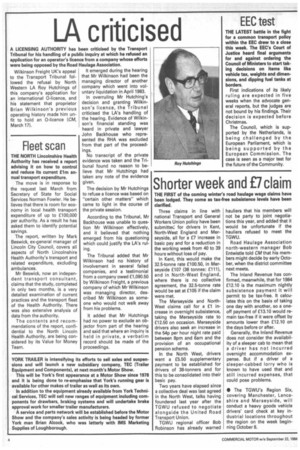Shorter week and claim
Page 6

If you've noticed an error in this article please click here to report it so we can fix it.
THE FIRST of the coming winter's road haulage wage claims have been lodged. They come as tax-free subsistence levels have been clarified.
Three claims in line with national Transport and General Workers Union policy have been submitted for drivers in Kent, North-West England and Merseyside, all for a E7 increase in basic pay and for a reduction in the working week from 40 to 39 hours without loss of pay.
In Kent, this would make the 32.5-tonne rate £100.50, in Merseyside £107 (38 tonnes: £111), and in North-West England, where there is no collective agreement, the 32.5-tonne rate would be set at £105 if the claim were met.
The Merseyside and NorthWest claims call for a £1 increase in overnight subsistence, taking the Merseyside rate to £12.50 on occasion. Merseyside drivers also seek an increase in the 54p per hour night rate paid between 8pm and 6am and the provision of an occupational pension scheme.
In the North West, drivers want a E5.50 supplementary payment to be established for drivers of 38-tonners and for this to be consolidated into their basic pay.
Two years have elapsed since a collective deal was last agreed in the North West, talks having foundered last year after the TGWU refused to negotiate alongside the United Road Transport Union.
TGWU regional officer Bob Robinson has already warned hauliers that his members will not be party to joint negotiations this year, and added that it would be unfortunate if the hauliers refused to meet the TGWU.
Road Haulage Association north-western manager Bob Entwistle told CM that his members might decide by early October, when the district committee next meets.
The Inland Revenue has confirmed, meanwhile, that for 1984 £12.10 is the maximum nightly subsistence payment it will permit to be tax-free. It calculates this on the basis of taking one day with another, so a oneoff payment of £13.10 would remain tax-free if it were offset by amounts lower than 02.10 on the days before or after.
Generally, the Inland Revenue does not consider the availability of a sleeper cab to mean that a driver has not incurred overnight accommodation expense. But if a driver of a sleeper-cabbed lorry who is known to have used that and still incurred expenses, that could pose problems.
• The TGWU's Region Six, covering Manchester, Lancashire and Merseyside, will conduct a heavy goods vehicle drivers' card check at key industrial locations throughout the region on the week beginning October 8.




























































































